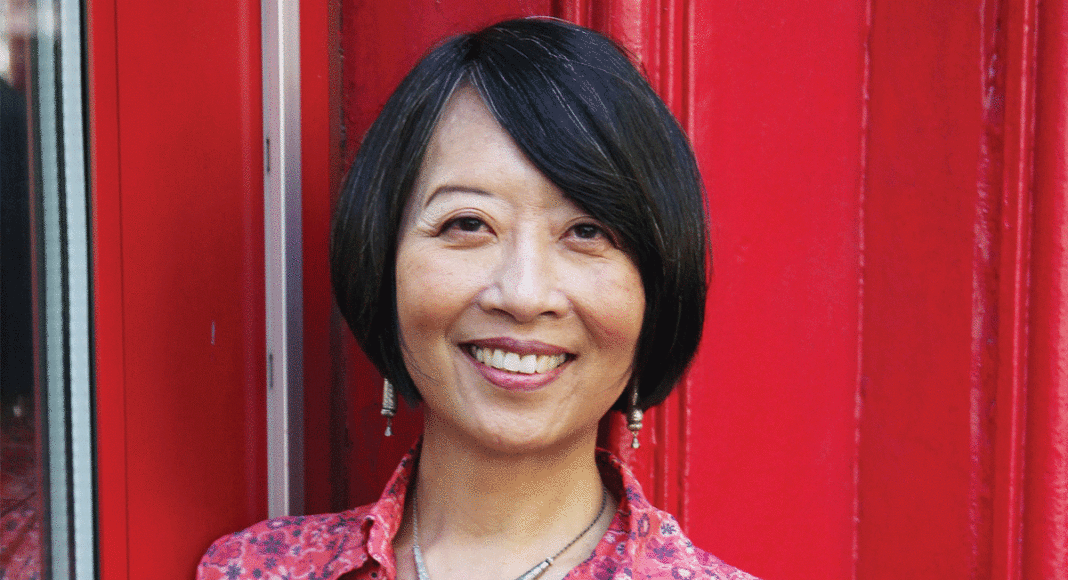Jeanne Sakata’s father never talked about his internment by his own country. He didn’t want her to hold resentment toward her country, and hoped his family could move forward and not look back.
Her father was in high school when President Franklin D. Roosevelt authorized Executive Order 9066 to relocate more than 120,000 people of Japanese ancestry (including U.S. citizens) to internment camps following the attack on Pearl Harbor in 1941. Sakata’s grandfather had moved to the Pajaro Valley in 1918, working as a farmer and raising his family. But when the mandate came, the whole Sakata family was relocated from Watsonville to a remote internment camp in Arizona.
“My father would always give me short answers, and then he would change the subject when I would ask about it,” Sakata remembers. “After they got out of those camps, many of the nisei—second-generation Japanese Americans—felt that the best way to deal with the trauma was to not talk about it. There was a sense of shame and humiliation that as American citizens, they had been treated like this.”
Because of the secrecy in her family, Sakata says, it wasn’t until she opened a textbook in high school that she understood what incarcerated Japanese Americans had gone through during World War II.
When Sakata saw the documentary A Personal Matter: Gordon Hirabayashi vs. the United States by John de Graaf, she was stunned that she’d never heard of Hirabayashi’s 50-year fight for equality and consciousness. Hirabayashi, a Washington University student during World War II, challenged the constitutionality of the forced relocation of Japanese Americans all the way to the Supreme Court. He lost his case, and it wasn’t until more than 40 years later that President Ronald Reagan offered a formal apology to Japanese Americans who were interned in the camps.
Sakata wanted to bring more attention to Hirabayashi’s story, so as a longtime playwright—in addition to her work as an actress in theater and television—she decided to do what she does best. Her one-man show Dawn’s Light: The Journey of Gordon Hirabayashi debuted in 2007 at East West Players in Los Angeles. Later retitled Hold These Truths, the play tells the story of Hirabayashi’s long fight for his rights as an American citizen. Over the course of the 90-minute show, actor Joel de la Fuente plays 37 characters, including Hirabayashi.
“When I eventually met Gordon and interviewed him, it was such a redemptive, enlightening experience,” Sakata says. “There were secrets that were long buried there for me, since my father never said much about it. Gordon was a storyteller, full of stories and details about it all.”
Hirabayashi died in 2012, at the age of 93, just before President Barack Obama awarded him the Presidential Medal of Freedom. He never did see Sakata’s show, but she says she knows he would have enjoyed it.
“He had a gift of optimism,” Sakata says. “He said ‘what I was trying to do is say yes to the America that I wanted to be part of. I wanted to be positive.’ He wanted to hold the country to a standard outlined in the Constitution. It wasn’t a protest, it was hope.”
The play has experienced a timely resurgence, having been produced nine times in the last two years. Though the political climate has changed dramatically since the show began, Sakata says she believes Hold These Truths continues to resonate with many people across various backgrounds who have experienced fear and mistrust of the government based on their heritage.
“Gordon took the Constitution as his Constitution, which gave him the strength to take the stand he did,” Sakata says. “That’s what it’s going to take today: an active citizenry that says ‘this is our Constitution, and we are going to fight for the rights that matter to us.’”
Whether it’s the Muslim ban or migrant children’s camps, many of the largest national issues today contain echoes of Hirabayashi’s story. Sakata says she has a lot of hope that the next generation will break the seemingly never-ending loop of racial biases.
“There are so many of us that are feeling threatened,” Sakata says of minority communities. “I am hoping that there will be a sense of empathy so that if one of us is threatened, all of us are threatened. That we will stick up for each other, and fight on behalf of everyone.”
‘Hold These Truths’ will be presented July 11-Aug. 5 at the Lucie Stern Theatre, 1305 Middlefield Road, Palo Alto. theatreworks.org. $35-$60.














I saw this play in Seattle. It was dynamic and honor the “right stuff” of Gordon Hirabayashi. Thank you Jeanne for this production.
I am writing from another country and apologise for not being able to speak openly. The American constitution is enviable even if there are problems with the immediate application of justice. I just want to say that any minority living in the US should also understand that these basic rights in the constitution are about equality. This includes racial equality and especially gender rights. If a (minority) citizen has beliefs that are against gender equality for instance, this does not mean this inequality has freedom to be applied or enforced on others or on minors ( I mean people that are still legally underage). The right to restrict one’s equality and freedom should be restricted and limited to the adult person who wishes it on him or herself. This opinion on restriction of course, does not include the right to free speech in its scope. I love the play: I was able to read it but I cannot watch it. Thank you Jeanne Sakata.